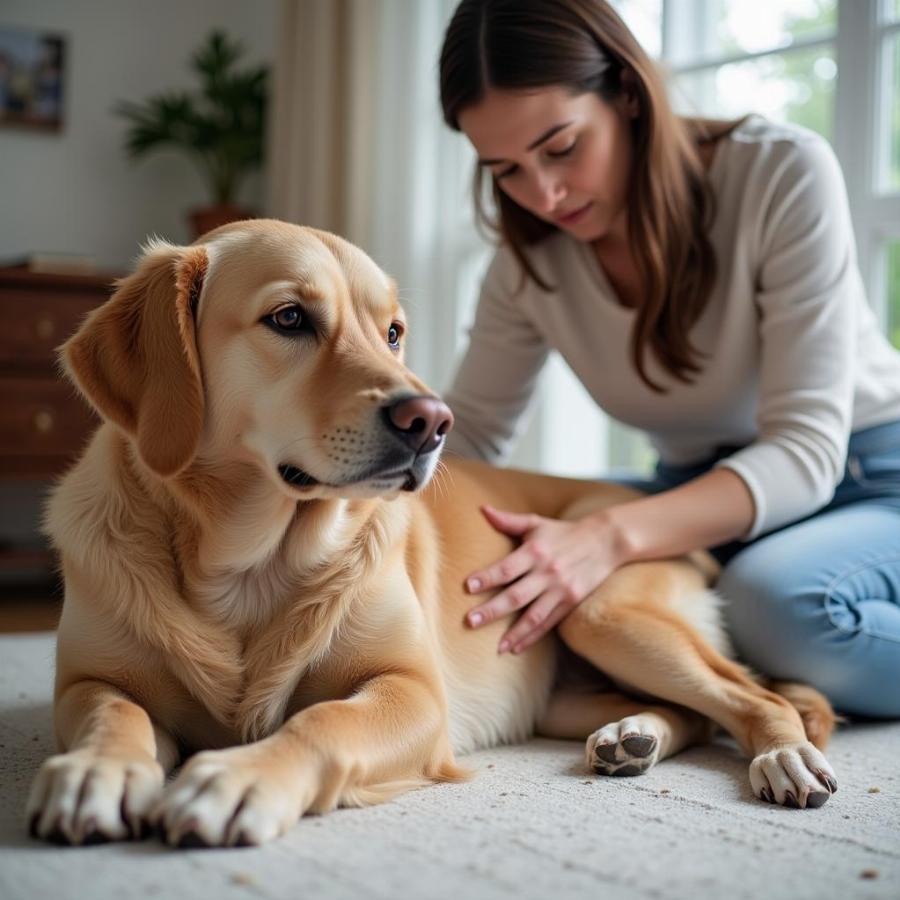Pancreatitis in dogs can be a painful and worrying experience for both the pet and their owner. Knowing how to comfort a dog with pancreatitis is crucial for managing their discomfort and promoting healing. This involves understanding the symptoms, providing a supportive environment, and working closely with your veterinarian to ensure your furry friend receives the best possible care. This guide will delve into practical steps you can take to soothe your dog during this challenging time.
Understanding Pancreatitis and its Discomforts
Pancreatitis is the inflammation of the pancreas, a vital organ responsible for producing digestive enzymes and insulin. When inflamed, these enzymes can leak into the surrounding tissues, causing pain, nausea, and other distressing symptoms. Recognizing these signs is the first step in providing comfort. Common symptoms include vomiting, diarrhea, loss of appetite, lethargy, abdominal pain, fever, and dehydration. If you notice any of these symptoms, it’s essential to consult a veterinarian immediately. Early diagnosis and treatment are key to managing pancreatitis and preventing serious complications. Why is my dog shaking and not eating? This could be a sign of several issues, including pancreatitis.
 Comforting a Dog with Pancreatitis
Comforting a Dog with Pancreatitis
Creating a Comfortable Environment for Your Dog
Providing a calm and comfortable environment is vital for a dog with pancreatitis. A quiet space away from loud noises and excessive activity can help reduce stress and promote rest. Make sure their bedding is soft and clean, and offer them a warm blanket for added comfort. Maintaining a comfortable temperature is also important, as both extreme heat and cold can exacerbate their discomfort.
Dietary Management for Pancreatitis
Dietary management is a cornerstone of pancreatitis treatment. Often, your veterinarian will recommend a bland, low-fat diet to give the pancreas a chance to rest and heal. pancreatitis in dogs diet homemade provides valuable insights into creating appropriate meals for your dog. It’s crucial to follow your vet’s recommendations strictly and avoid giving your dog any treats or table scraps that could aggravate their condition. Remember, even small amounts of fatty foods can trigger a painful flare-up.
Pain Management and Medication
Pain management is another crucial aspect of comforting a dog with pancreatitis. Your veterinarian may prescribe pain medication to help manage your dog’s discomfort and improve their quality of life. Never give your dog human pain relievers, as many are toxic to dogs. Always follow your vet’s instructions carefully regarding medication dosage and administration.
Hydration is Key
Maintaining proper hydration is essential for dogs with pancreatitis, especially if they are experiencing vomiting and diarrhea. Encourage your dog to drink water by offering fresh, cool water frequently. You can also try adding a little low-sodium chicken broth to their water to make it more appealing. In some cases, your vet might recommend subcutaneous fluids to ensure adequate hydration.
When to Seek Veterinary Attention
While home care can significantly improve your dog’s comfort, it’s crucial to monitor them closely for any worsening symptoms. If your dog’s condition deteriorates, or if they show signs of severe pain, increased vomiting, or lethargy, seek immediate veterinary attention. Early intervention is crucial for managing pancreatitis and preventing potentially life-threatening complications. If your dog has high lipase levels, which can indicate pancreatitis, you may want to read more about dog high lipase. Are you wondering can dogs eat purple yam? It’s always best to check with your vet before introducing new foods, especially if your dog has pancreatitis.
Conclusion
Comforting a dog with pancreatitis requires patience, understanding, and a commitment to providing a supportive environment. By understanding the symptoms, managing their diet, providing pain relief, ensuring hydration, and working closely with your veterinarian, you can help your furry friend through this difficult time and on the road to recovery. Remember, early diagnosis and consistent care are key to managing pancreatitis and ensuring your dog’s well-being.
FAQ
- What is the most common cause of pancreatitis in dogs? High-fat diets and obesity are significant risk factors.
- How long does it take for a dog to recover from pancreatitis? Recovery time varies, but it can take several days to weeks.
- Can pancreatitis in dogs be cured? While there’s no cure, it can be managed effectively with proper treatment and dietary changes.
- What are the long-term effects of pancreatitis in dogs? Some dogs may develop chronic pancreatitis or other complications.
- Can dogs with pancreatitis eat treats? Treats should be avoided, especially those high in fat, during pancreatitis flare-ups.
- What kind of bland diet should I feed my dog with pancreatitis? Boiled chicken and rice are often recommended.
- Is pancreatitis contagious? No, pancreatitis is not contagious to other animals or humans.
Further Reading
For more information about dog health, you can explore related articles on our site, such as information on an la style hot dog (for yourself, not your pup!).
Beaut Dogs: Your Trusted Source for Dog Care
Beaut Dogs is your go-to resource for all things dog-related, providing expert advice and valuable insights into the world of canine companions. We offer a wealth of information on dog breeds, health, nutrition, training, and much more. When you need support, don’t hesitate to contact us via Email at [email protected] for detailed and accurate answers from Beaut Dogs. Visit https://beautdogs.com today to discover the wonderful world of dogs and learn how to care for them best!